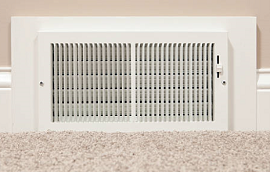While air vents are an integral component of any HVAC system, generally, they are unobtrusive. You may not even notice the vents that have been discreetly placed in your walls, ceiling or flooring. Unfortunately, when your vents do start to make noises, particularly high pitched sounds, it can be very disconcerting. So, why have your vents suddenly started being so noisy?
All vents make some degree of noise when your system is running. Whether it is a floor vent, return grille, ceiling diffuser or supply register, you can expect some noise caused by the system fan running. This is perfectly normal, and some systems will be louder compared to others. Some systems may even be much louder than you may be used to. For example, if you have a home with lots of return air ductwork including a return vent in each room, the system is likely to be far quieter compared to one that has just a single return grille directly cut into the equipment return duct. While there is technically nothing wrong with either scenario, the latter is a less expensive equipment installation and is likely to cause much more noise.
So, if you’ve recently moved to a new home, it may be that your new system is simply noisier than at your previous home and the noise is not an indication of an underlying problem.
High Pitched Noises
If you have recently started to notice a high pitched sound emitting from your return vents, it could be an indication of a problem. This type of noise can be easily noticeable and sounds a little like a tuning fork. This is typically an indication that there is a lack of return air. As the system needs to pull greater amounts of air, the velocity and pressure increase, creating that distinct sound. When more return air is added, the system no longer has to work as hard and as the pressure drops, so will the noise level.
Addressing the Underlying Issue
Of course, knowing what is causing the noise is a completely different thing than addressing the underlying issue. You need to understand why there is a lack of return air, to not only stop the noise, but reduce the strain on your system that could eventually compromise the lifespan of your equipment.
There could be a number of reasons why there is insufficient return air. This can range from a simple blocked air filter to incorrectly installed or undersized ductwork. If the problem is a recent development, it is likely due to a blockage. You should check for dirty air filters and ensure that someone hasn’t closed off vents. Your system is designed to move a particular volume of air, and when the vents are closed off, it creates a pressure problem as airflow is restricted. Many people assume that closing off vents will save energy, but it can create costly repair issues, so it is better to consider installing zoning on your system.
Other Noises
If your vents are making other types of sounds including flapping or rattling noises, this is likely to be due to some form of debris in the ductwork. It is not uncommon for small toys, plastic, and even nails or screws to enter the ductwork and start to make a noise. It is a good idea to check for obvious issues, but if you can’t trace the source of the sound, call in a professional technician to inspect your system.

